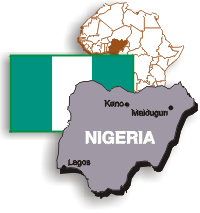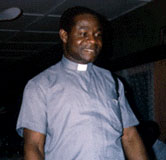


 |
Nigeria, West AfricaNigeria has a population of some 115.3 million people occupying an area of 356,667 square miles. Lagos is its capital. The life expectancy of men is approximately 47 years while that of women is approximately 49.The religions of Nigeria are: Muslim, 45%; Protestant, 25%; Roman Catholic, 12%; African Christian, 11%; Traditional Beliefs, 6%; and Other, 1%. There are a number of ethnic groups: Hausa, 21%; Yoruba, 21%; Igbo, 18%; Fulani, 11%; Ibibio, 7%; Kanuri, 4%; Edo, 3%; Tiv, 2%; Ijaw, 2%; Bura, 2%; Nupe, 1%; Other, 8%. |
How It All Began For Us In Africa.It all began with a wonderful and humble bishop by the name of Bishop Gbuji who simply invited Sr. Jan Nattermann and me to come to the diocese of Issele-Uku in September of 1991 and give the priests there a training in our parish evangelization process, ACTS II: Conversion, Proclamation, Community.Leadership Training.What follows are pictures of the priests preparing for the role plays that they will do within the ACTS II Training to demonstrate that they have made the skills of evangelization their own. |
 |
 |
| After Sr. Jan and I had given the ACTS II Leadership Training, the priests put on a traditional evening of celebration for us on the eve of our departure for Rome. Two lovely traditional white African dresses were made for us for the occasion. Here are some of the pictures. |
 Sr. Jan, Fr. Fidelis and Sr. Angeline -- both of us in white dresses |
 Fr. Jim Bermingham, the Bishop, Sr. Jan and Sr. Angeline |

A group picture of the priests with Sr. Jan and Sr. Angeline

| Bishop Gbuji not only has a vision of evangelization for all of Nigeria but an all encompassing vision for all of Africa. One aspect of his vision for Nigeria was that by the end of 1994, the ACTS II Process would be functioning in each of the 35 dioceses in Nigeria. What we know to date is that the Acts II Process is in every diocese except one and is functioning in parishes, too numerous to count, throughout Nigeria. |
 Ernie Chauvet, Bishop Gbuji, Sr. Angeline and Sr. Jan |

|
In March of 1992, Fr. Kevin Ori and Fr. Chukwubikem Okpechi, O.P. took the 15 Day Leadership Training of ACTS II into Asmara, Eritrea which had gained their independence from Ethiopia on the 26th of May, 1991. |
 Fr. Chuks Okpechi, O.P. |
 Fr. Kevin Ori |
| "Our arrival in Asmara was to them a blessing from God and a fruit of their freedom and independence. Many of the candidates work during the day and so our training was scheduled for the evenings and the workers, no doubt, came to classes from their offices and places of work. Priests and religious who participated in the programme numbered 36. There were 81 lay people. We followed the ACTS II Programme of Conversion, Proclamation and Community." |

|
A wonderful book that was put out by Bishop Gbuji and many of the priests who went through the ACTS II
Leadership Training in 1991 is: New Evangelization in Nigeria -- A Pastoral Contribution to the Synod for Africa, published by Kmensuo Educational
Publishers, Onitsha, Nigeria.
In chapter two, The Meaning, Origin and Contents of Evangelization by Bishop Gbuji, he states:
In chapter fourteen, Schools of Evangelization in Nigeria, by Fr. Fidelis Igwenwanne, Co-Ordinator, Emmaus School of Evangelization, Issele-Uku, he states:
In the conclusion of the book, written by Bishop Gbuji, he states:
|
